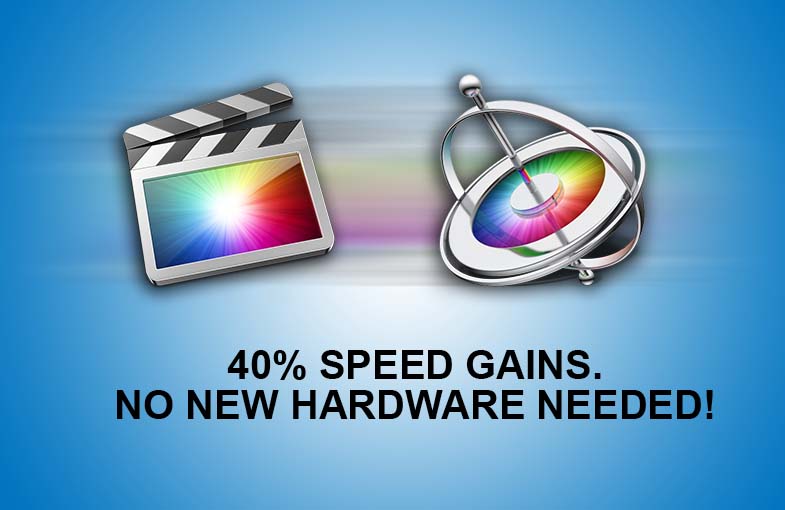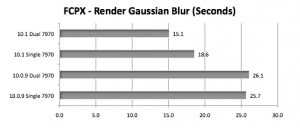The “Mad Scientist” Rob Art Morgan posted a series of benchmarks on his BareFeats blog that show how beneficial it is for the end user if developers take full advantage of new software technology.
Before I start writing anything I have to ask Rob the burning question. Why is the blog called Bare Feats?
Rob took the newest version of FCPX 10.1 and Motion 5.1 and pitted them against their previous releases on the same hardware. The testing was done on a legacy Mac Pro tower running single and dual Radeon 7970 AMD GPUs.
The biggest question he was hoping to answer was whether there were any speed gains because of the newly optimized code.
See the entire list of results here.
According to Rob’s findings, both FCPX 10.1 and Motion 5.1 run circles around the previous versions without the need for new hardware. Let me say that again.
THERE IS NO NEED FOR NEW HARDWARE!!
Apple has coded the software so that it scales nicely on older systems and will provides speed gains on your existing hardware. These aren’t marginal gains either. Render times on single GPU towers were 40% faster in 10.1 vs 10.09. The gains were even better if you added a second GPU to your legacy Mac Pro tower.
Imagine getting a 40% speed boost without buying a single piece of new hardware.
Imagine getting a 40% speed boost without paying to upgrade your software.
Imagine getting a 40% speed boost without being charged a subscription fee every month.
Imagine getting a 40% speed boost PERIOD.
I remember upgrading from FCP Studio 2 to Studio 3. I was looking forward to running the new software on my 8-core Mac Pro believing that Apple would finally take advantage of all the processing power that was available. Needless to say Final Cut Studio 3 was no faster than Final Cut Studio 2.
I don’t think I have ever gotten a noticeable speed boost in After Effects by simply updating the software.
This is why Apple tossed the legacy Final Cut Pro code out the window. They knew they needed a new underlying foundation which would allow the program the ability to scale as new SOFTWARE technologies became available. The decision to rewrite FCPX from the ground up is staring to provide real dividends for the end user. (Of course eliminating the backward compatibility with earlier versions of FCP was not such a great idea. But I digress. Completely changing the NLE paradigm that had been established over the previous 20 years was also a bit upsetting. But I digress again. Can someone digress twice?).
Apple did the same thing when they transitioned from OS9 to OSX. Blow it up and start over. Transitions like these might cause short-term pain for developers but I believe the alternative, in this case holding onto legacy code, can prove to be even more painful as time goes on.
Microsoft’s forward progress is continually stunted as they try to build each NEW operating system that still works with OLD hardware and software. Avid’s codebase is completely stuck in a time warp that dates back to 1994. I’m going to assume this is because of financial constraints and a notoriously stubborn user base. Adobe’s task of optimizing their aging code keeps getting bigger and bigger with every new version. I’m still holding onto the idea that Adobe has a team of programmers dual-coding every new feature and at some point they are going to pull an announcement that is similar to the one that Steve Jobs made when he revealed that OSX had been simultaneously programmed to run on Intel processors. I can’t imagine Adobe is not feeling the groundswell of rising backlash from the user base at this point. People can tell when a company is milking a product for all its worth. I have to believe (hope) that the Adobe corporate execs have finally made the decision to spend the money to get the codebase current. We all remember the debacle that Quark brought on themselves. Case studies exist so corporate execs can avoid the pitfalls made by their peers. They are ignored at your own peril.
Head on over to Barefeats.com and read through the list of benchmarks that Rob has been compiling. There are many highlighting the new Mac Pro. Some are not as encouraging as others!!
Have a good weekend!!
Lou Borella
Related Posts
While waiting for Adobe’s response, along came Pixelmator … Next Post:
Form over Function?





